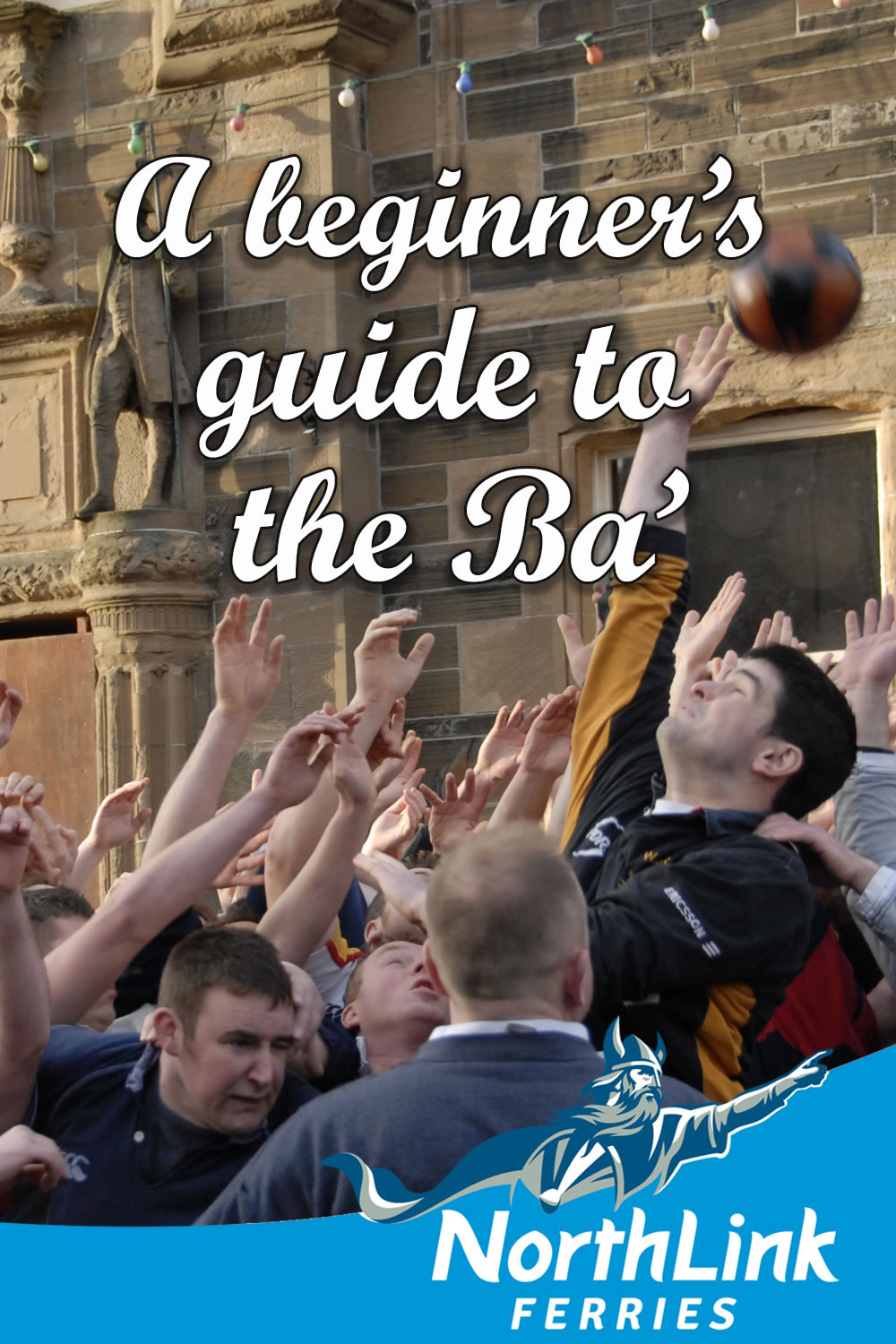A beginner’s guide to the Ba’
Visitors to Orkney at Christmas may be surprised to see planks being bolted into place, barricading the windows and doors of shops on Kirkwall’s main street. These are the preparations for the Ba’, a traditional game played on Christmas Day and New Year’s Day, beginning under the steeple of St Magnus Cathedral.
For many Kirkwall households, the Ba’ holds such importance that Christmas dinner is delayed until the following day.
In the game, two teams must fight through the streets of Kirkwall, carrying, kicking, or smuggling a leather ball towards their respective goals.
There are no time limits, no limits to the number of players, and few rules!

How the game is played
The Boys’ Ba’ starts at 10:30am and the Men’s Ba’ begins at 13:00. With his back to the Market Cross and a crowd before him, a Ba’ stalwart will throw the Ba’ up from the Kirk green.
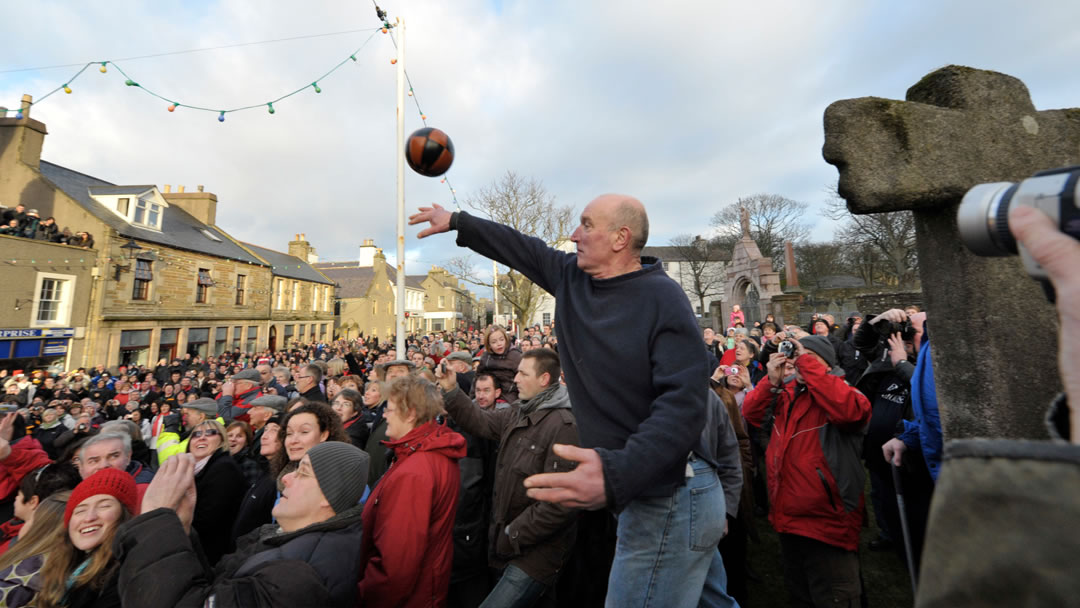
A surge of bodies will leap upwards to receive it. What follows is surprisingly rough. A scrum will gather around the players in possession of the Ba’, and many hands will try to wrestle it away.
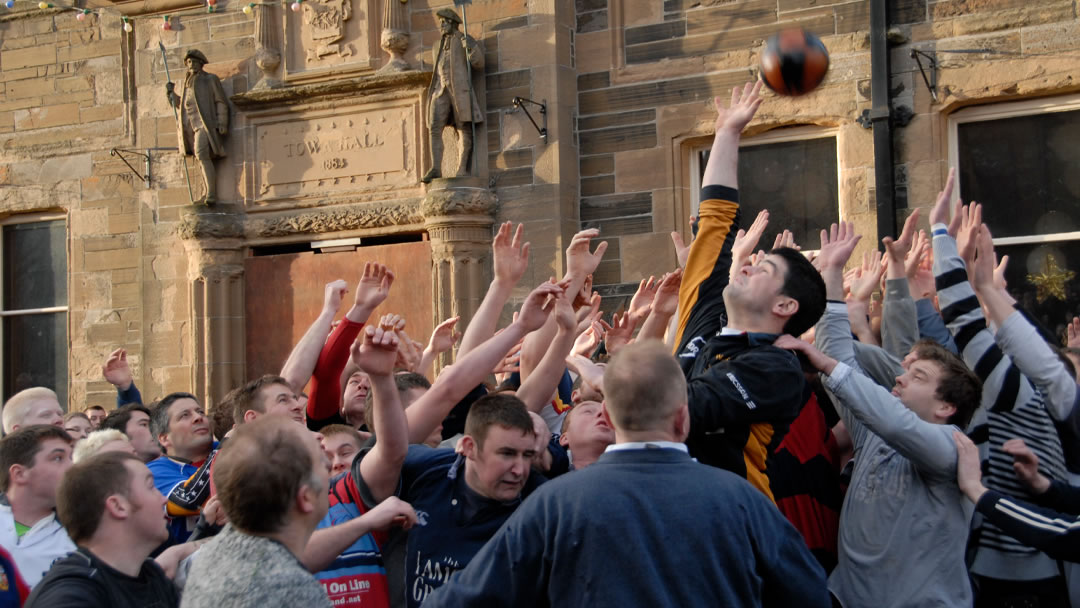
Every now and then the pack will break, chaos erupts, and players will run with the Ba’, attempting to get a little closer to their goal. Very soon they are intercepted and the scrum forms again.
This struggle to gain ground means a game can last for hours. Once the Ba’ reaches its goal, a winner will be decided, and the trophy is Ba’ itself – a coveted prize.
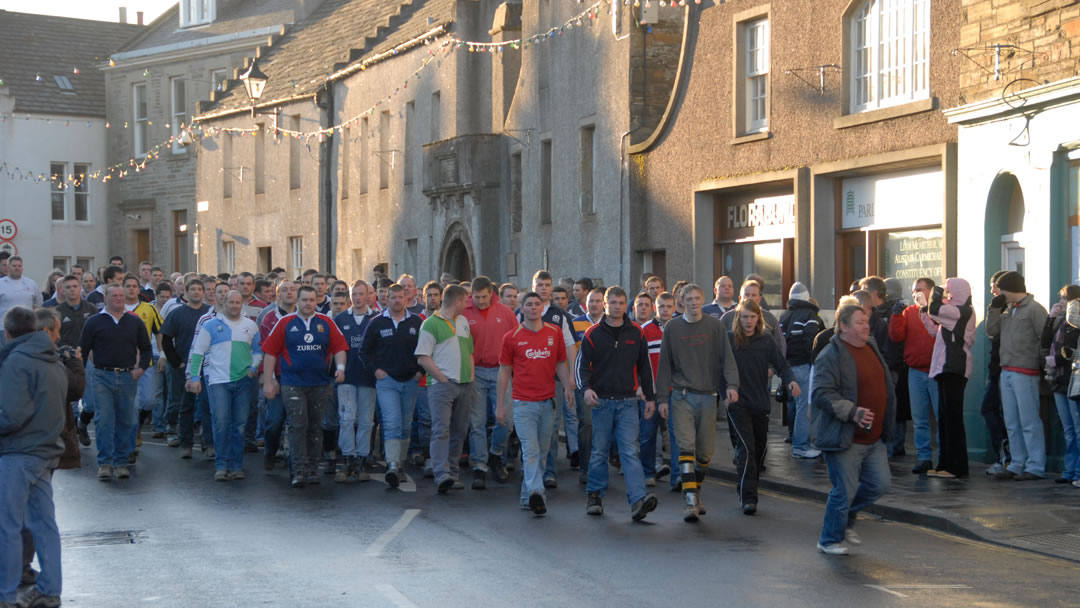
The Uppies and the Doonies
For the Ba’, the Orkney men are divided into two teams – the Uppies and the Doonies. These names are shortened versions of ‘up the gates’ and ‘doon the gates’. Gates is a misunderstanding of the Old Norse ‘gata’, which means path or road.
In the old days Uppies and Doonies were determined by where they were born (the dividing line is a lane opposite the Cathedral) or by how they first entered Kirkwall. As nearly all births these days take place in the hospital, players now play on the same side as their father and grandfather.
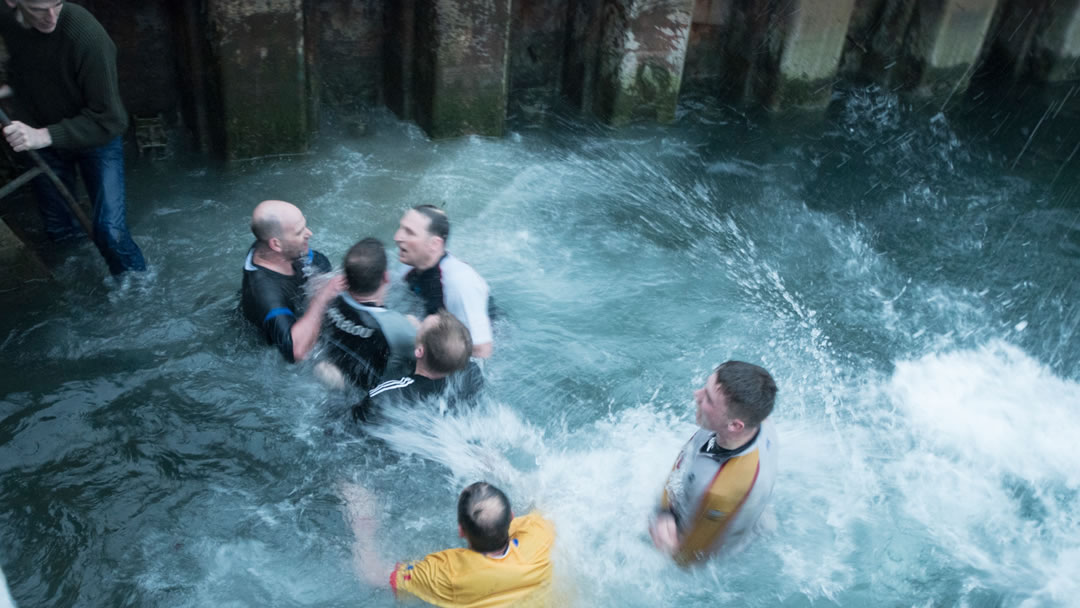
To win the game, the Uppies must touch the Ba’ against a wall called Mackinson’s Corner opposite the Catholic Church. The Doonies must immerse the Ba’ in salt water, dropping it into Kirkwall Harbour, in an area called the basin. This can be a sensational finale, with men falling into the cold midwinter sea.
At the start of the game, the two sides prowl from either side of the town to meet at St Magnus Cathedral and glare at each other, almost like high noon in a Western.
Making the Ba’
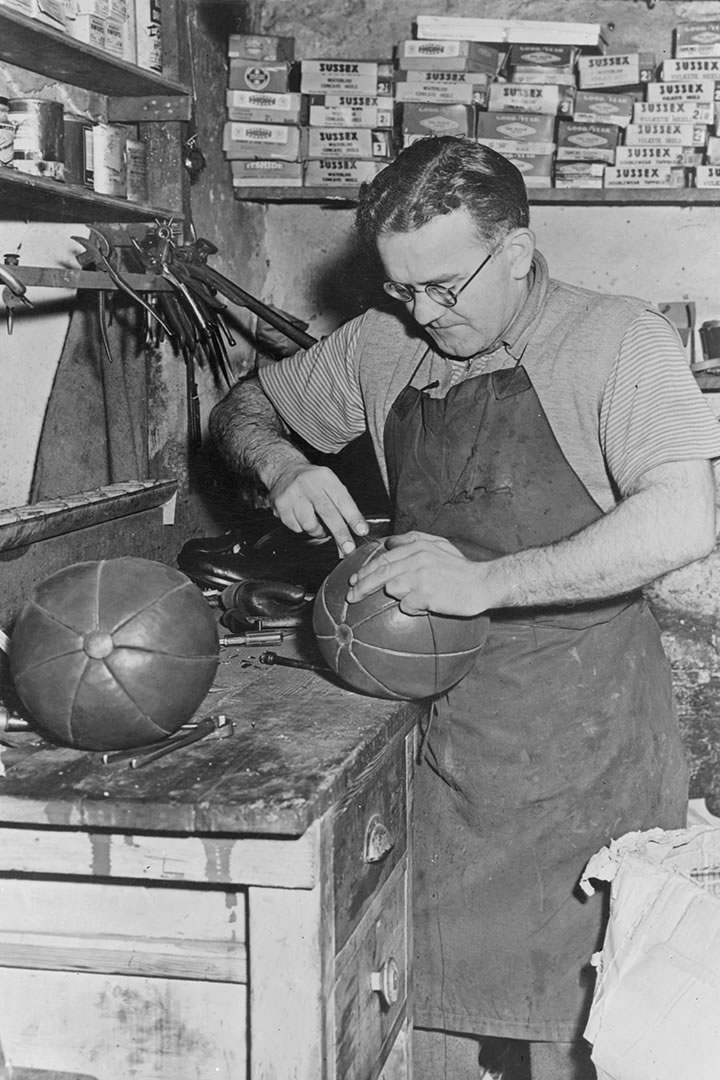
The Ba’ resembles a 19th century soccer ball. It’s much tougher though, crafted to withstand the amount of grappling it must endure. It is made of leather panels hand-stitched together and hard packed with cork dust. Cork means the Ba’ will float if it reaches the harbour. Most panels are a natural brown colour, but some are painted black.
On average, the Men’s Ba’ weighs 1.3kg and is 19cm in diameter. The Boy’s Ba’ is slightly smaller.
A new Ba’ is made for every game. However, for a few years after the war it was impossible to find materials to make a new Ba’ and older Ba’s were donated to be used again.
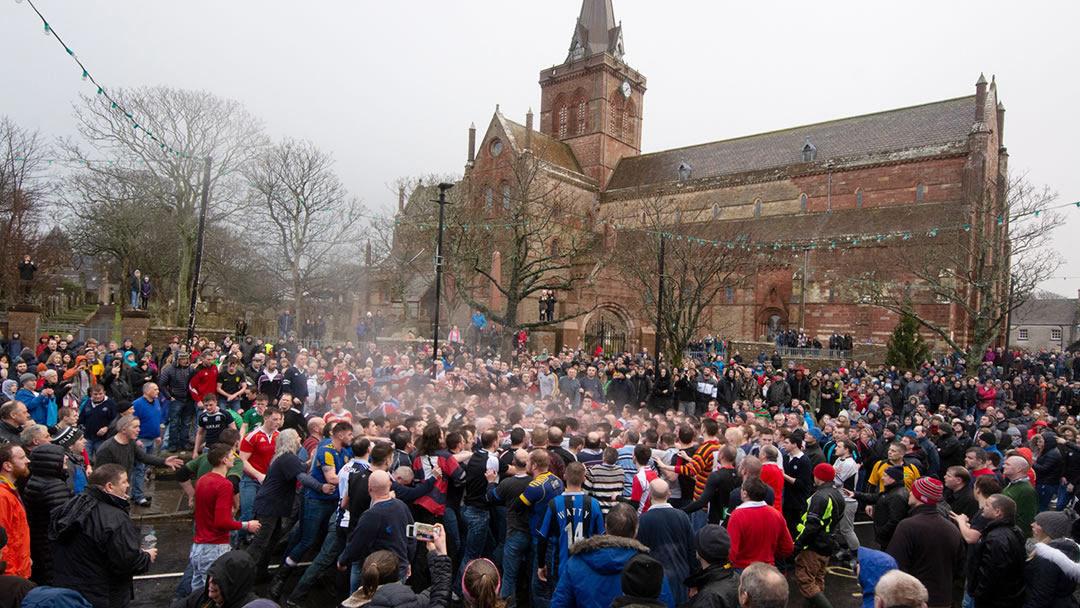
The experience
Hundreds of people will attend the Ba’ game. There can be 75 to 100 players per side at any one time, and many more spectators, who stand close to the action. If you are new to the Ba’ it is worth knowing that spectators often need to quickly move away from a rolling tidal wave of men.
Playing in the Ba’ can be a quite brutal experience. Though most Ba’ players know who is an Uppie and who is a Doonie, there are no uniforms to tell them apart. Old clothes are worn, and work boots donned to protect feet. Watches and valuables are left at home. Trouser legs and sleeves are usually bound by gaffer tape.
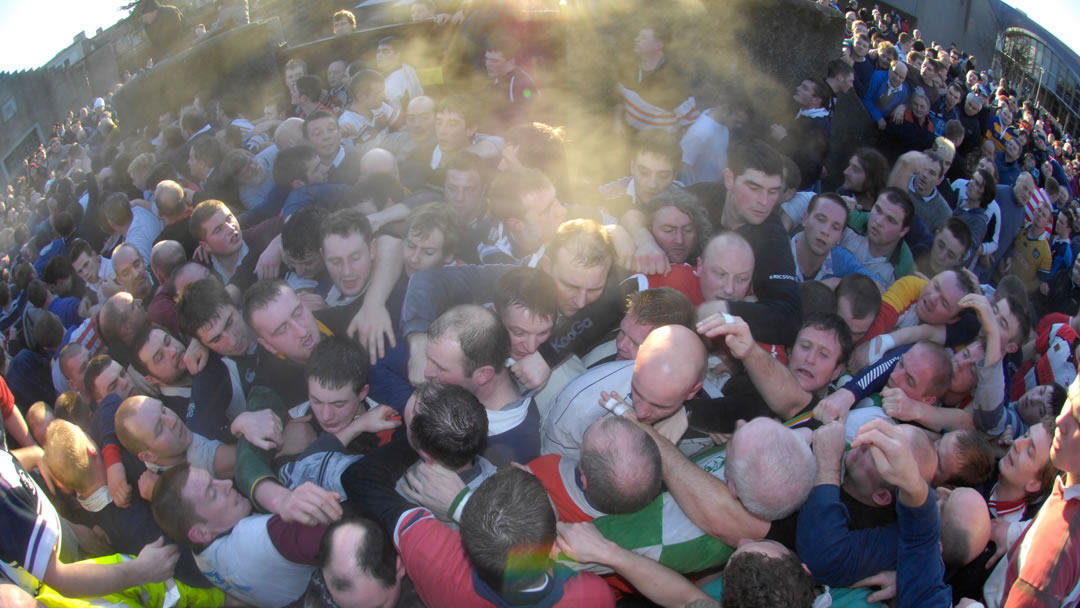
Within the scrum there is tremendous pressure. There is pushing from all sides. Fists fly inside the pack. Those on the outside are told to ‘lie on’, pushing the scrum from the rear. When the mass of men meets buildings and walls, those on the outside of the scrum can be crushed. The game becomes much harder when it moves from Broad Street to narrower lanes.
Despite the lack of rules, respect for the spirit of the game is expected. If a player become injured or passes out, play will stop to allow them to be taken out of the scrum to safety.
Very often players have no idea where the Ba’ is, and teams take advantage of this. Fake breaks are created to distract the opposition. Sometimes the Ba’ can even be smuggled out of the pack. The sun sets at 3 o’clock in December in Orkney, and as darkness falls, the game becomes more difficult. The ground may also be slippery with snow or ice.
The longest a Men’s Ba game has lasted was 7 hours (New Year’s Day 1975) and the shortest was 4 minutes (Christmas Day 1952).
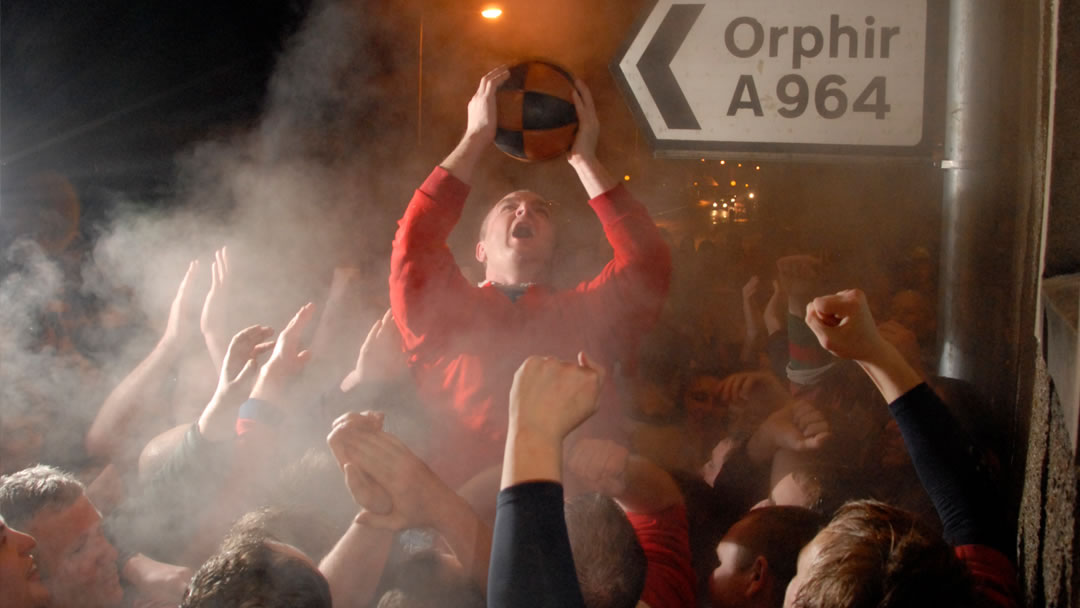
Plans beforehand
For a game that appears to have no rules, there is some organising to do. This is handled by the Ba’ Committee which is made up of 5 Uppies and 5 Doonies. The Ba’ Committee raises funds, organises the crafting of the Ba’ and chooses who will throw the Ba’ up.
The individual teams tend to meet the evening before. By the fireside and over a dram, they greet old and new players, and discuss tactics for the day.
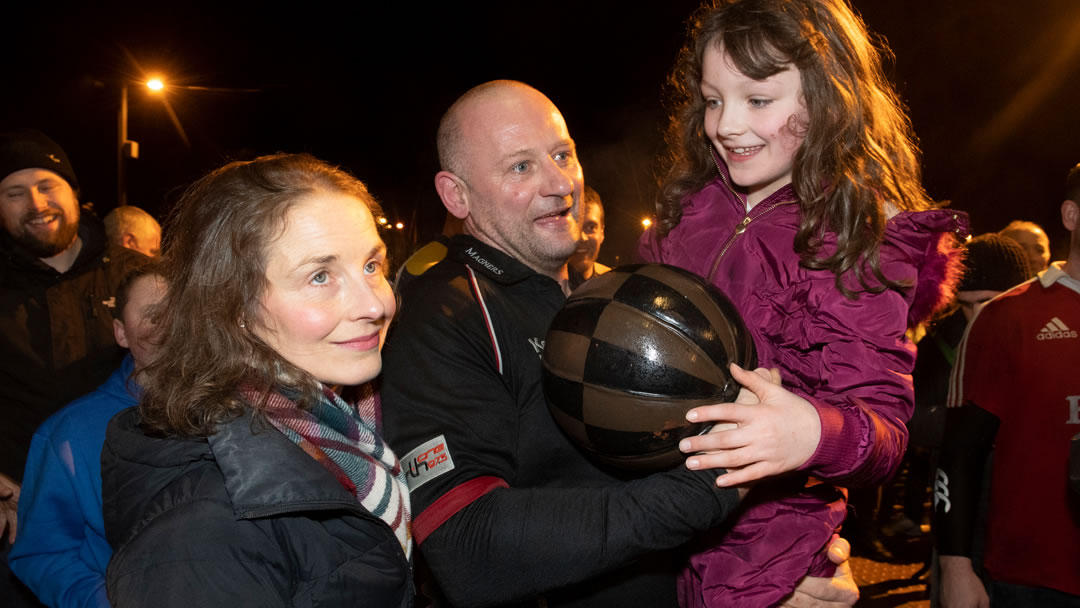
The winner
One of the most surprising elements of the Ba’ is how the winner is decided. Once the Ba’ has reached its goal, the player who brought it there may not necessarily be crowned the winner.
Instead, a scrum may form on the winning side, and those men will engage in a long fight over who should be the winner. The winner could be someone who played well, or a player who has participated over many years.
Afterwards the winner will host a party in their house. The celebration can last for several days. The Ba will be repaired, varnished, and proudly put in display in the winner’s home. James Linklater, who won the 2011 Christmas Day Men’s Ba’ said that, if given the choice between winning a Ba’ or a full cap for the Scotland Football Team, he would take the Ba’.
In the old days, if the Ba went ‘doon’ it would be fastened to the tallest sailing ship mast in the basin.
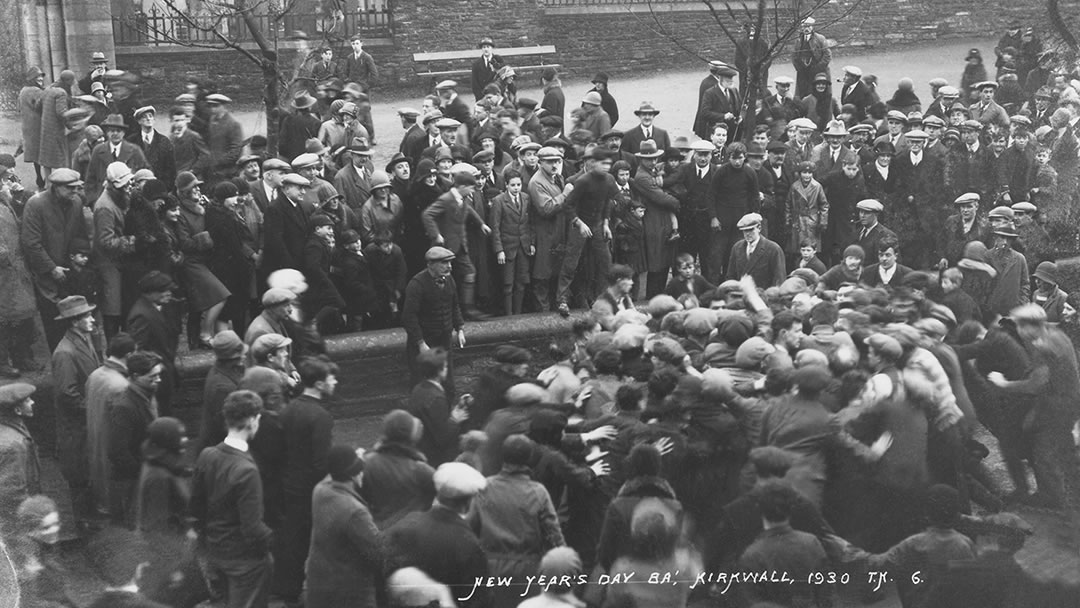
The History of the Ba
Mass football was played in Roman-occupied Britain, and there are similar events elsewhere in the UK, most notably in some Scottish Borders towns and in Alnwick in Northumberland, Ashbourne in Derbyshire, Sedgefield in County Durham, and Workington in Cumberland.
The Norse enjoyed rough sports, and each Orkney parish had a ‘leaquoy’ (Old Norse for games field). Mass football matches were traditionally played in Orkney at Yule time. The first records of the Ba’ described an old-style football game played in 1650 at the Ba’ lea, to the east of the Cathedral. This moved to the Kirk green, and then onto the streets in 1800, though the Ba’ remained on the ground.
However, it was not long until the restricted space of the streets meant that, by 1850, the Ba’ was picked up instead of kicked.
At first only the New Year’s Day Ba’ was played, as that day was a holiday and Christmas Day was not. The Christmas Day Ba’ only became popular from 1870 onwards. Tradition states that if Christmas Day and New Years Day fall on a Sunday, the Ba’ will take place on the following day.
There have only been a few years (during wartime and the COVID pandemic) where the Ba’ has not been played. However, the authorities have made attempts to stop this violent game over the years. In 1875 a rugby match took place instead, and in 1883, it was proposed to limit the teams to 20 men. These days though, the game is more popular than ever.
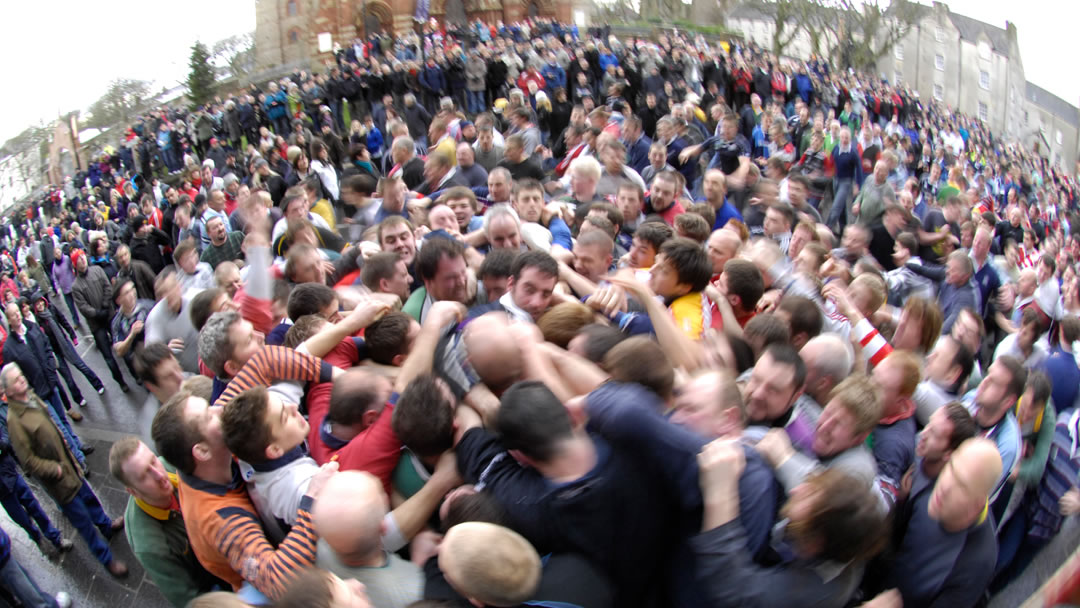
Notable events
There have been many notable games throughout the Ba’s history.
These include games where the Ba’ game went into the peedie sea, and others where the Ba’ was smuggled away in a car. Once the game erupted into the Albert Hotel, breaking into a bedroom, and out through a kitchen and hall.
During the 1966 New Year game, the Ba was brought ‘doon’ to the harbour and dropped over the wall to the water. However, before it touched the sea, it was grabbed by a well-hidden Uppie. He stole the Ba’ away to their goal and won the game, leaving the other puzzled players behind.
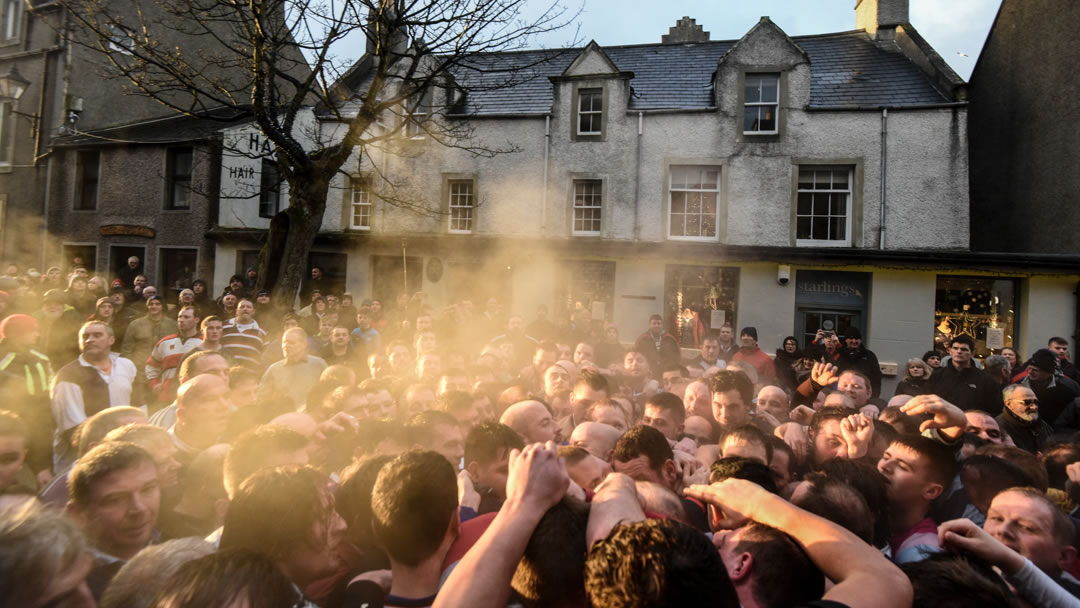
In 1901, an Uppie feigned an injury and withdrew from the pack. No one checked his condition too closely though, as the Ba’ was hidden under his coat! He sneaked away to the Uppie goal to win the game.
Only one fatality has occurred during the Ba’, when in 1903, a Doonie sadly suffered a heart attack.
Finally, there’s the tale of a doctor who was a keen player. Due to attending church, he missed the start of the game, so he raced into the pack, still wearing his frock coat. Then during the game, he attended to a player who had broken his leg. He set it in a splint and joined the scrum again!
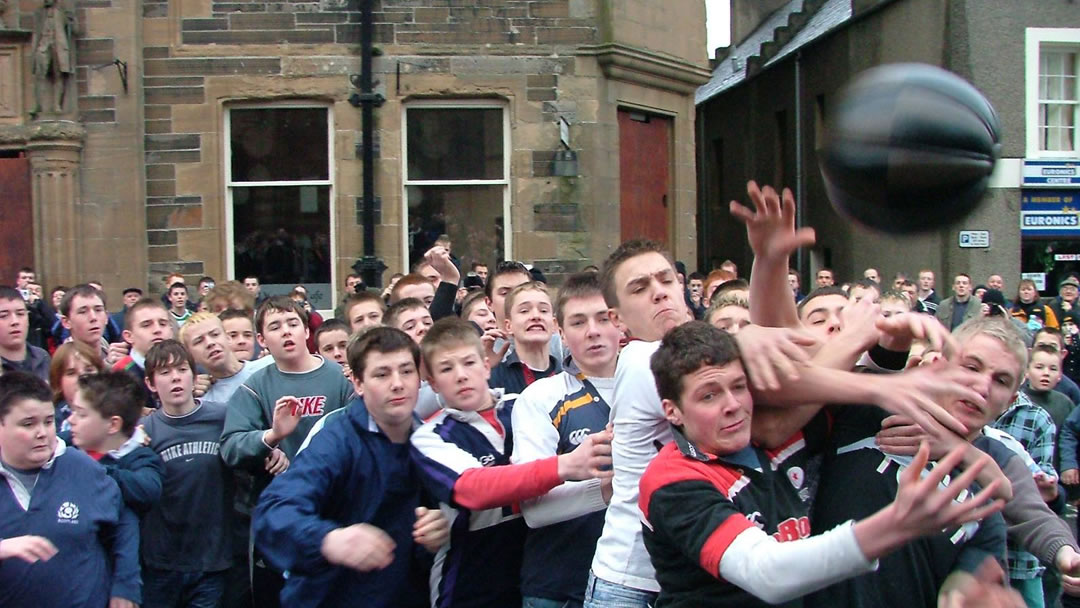
Other Ba’ games
The Boy’s Ba’ is played before the Men’s Ba’. Open to boys under the age of 16, it is still a ferocious contest and offers an apprenticeship for the Men’s game.
There was a Youth’s Ba (for ages 16 to 21) from 1892 to 1910. However, the third event meant less time for the Men’s Ba, so did not last long.
Post war, a women’s Ba’ was tried, but it only lasted a single year. The idea of ladies participating in such a rough event did not find favour. These days women are enthusiastic supporters and a big part of the Ba’!
In the past there were Ba’ games in Stromness (from 1884 to 1923), in Orphir (during the 1890s) and in Holm (ending in 1910). Now only the Kirkwall game remains.
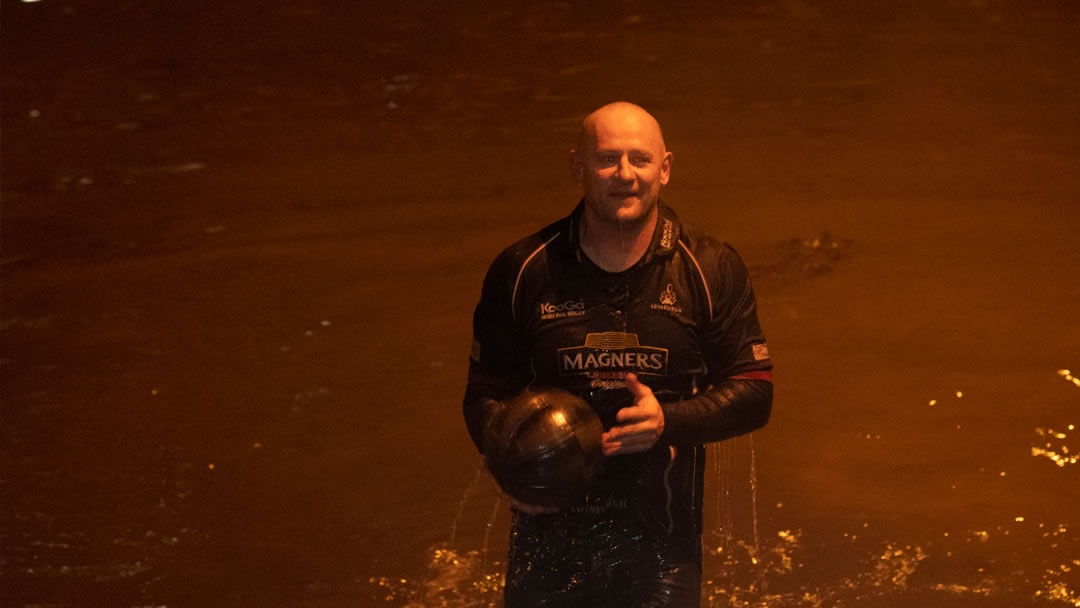
Tradition
For many Kirkwall households, the Ba’ holds such importance that Christmas dinner is delayed until the following day.
However, to outsiders, this rowdy game may seem to be a little scary. Though tempers can fray during the game, once it is over, Uppies and Doonies will return to being good-natured neighbours and friends. For the spectators, the sight of steam rising from the scrum on a cold winter’s day is an impressive one, and the Ba’ is a marvellous social occasion.
Tradition states that an Uppie win will bring about a good harvest, and a Doonie win will bring good fishing.
Whoever wins the Ba’, all the people of Orkney benefit from supporting such a unique tradition, as wild and unpredictable as the raging north wind.
 By Magnus Dixon
By Magnus DixonOrkney and Shetland enthusiast, family man, loves walks, likes animals, terrible at sports, dire taste in music, adores audiobooks and films, eats a little too much for his own good.
Pin it!